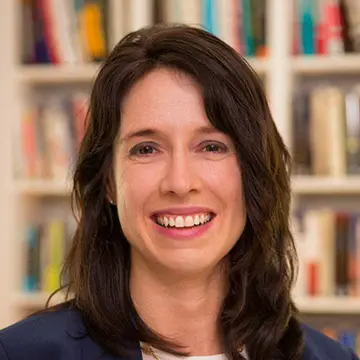How to lead future-ready organizations in times of uncertainty
Here are four ways that leaders can effectively respond to challenges and thrive amid the unknown, from MIT Sloan experts.

Faculty
Kate Isaacs is a scholar, teacher, and strategy advisor who designs organizations and stakeholder partnerships for people and places to thrive. She draws on design thinking, system dynamics, and developmental psychology to help leaders create conditions for collective intelligence, agile performance, and transformative change.
Isaacs is a Senior Lecturer at the MIT Sloan School of Management, where she teaches courses on Discovering Your Leadership Signature and Distributed Leadership: Cultivating Nimble Organizations. A recent interview with Isaacs and her colleagues about their work on Nimble Leadership was selected for publication in HBR at 100: The Most Influential and Innovative Articles from Harvard Business Review’s First Century.
She is cofounder of a new MIT Sloan Executive Education program in 2024, Businesses for Inclusive Local Thriving Lab (BILT-Lab) for business-led teams to accelerate their impact on local talent development, workforce participation, and community prosperity. She also teaches short courses on topics of Leading with Purpose, Optimizing Team Performance, and Adaptive Distributed Innovation, all with a focus on inclusive innovation and human thriving.
Isaacs is an executive fellow at the Higher Ambition Leadership Alliance, where she serves as lead faculty for HALI, a 9-month leadership development program for senior business executives, and hosts CEOs Leading Local, a peer learning network of business coalitions that are driving social and economic change in their communities.
Isaacs consults with organizations in all sectors on strategy and culture change, and she specializes in designing peer-based learning experiences and facilitating multi-stakeholder collaborations. She is a certified Shadow Work coach and is trained in Internal Family Systems therapy. She emphasizes the positive potential in people and organizations—noticing and expanding what is already working—and releasing obstacles that block our natural orientation towards joy, creativity, growth, and health.
She is a dynamic and engaging speaker who delivers inspiring keynote addresses to large corporate audiences. She is a frequent author on topics of leadership, innovation, systems change, multi-stakeholder collaboration, and corporate sustainability for publications including the Harvard Business Review, the Sloan Management Review, strategy+business, Chief Executive, The Hill, and The Conversation.
Isaacs holds a PhD in organization studies from the MIT Sloan School of Management, an MS degree in technology and policy from the MIT Engineering Systems Division, an MS degree in conscious evolution from the Graduate Institute, and a BS in biology from the Oakland University Honors College.
She lives in Concord, Massachusetts with her family, and loves running, biking, painting, yoga, skiing, gardening, tending chickens, adventures with her kids, and repairing stuff around the house. She occasionally commutes to Colorado in the winter, where she finds no greater joy than telemark skiing in fresh Rocky Mountain powder.
ay, Jason, Kate Isaacs, and Hong Linh Nguyen. Harvard Business Review, January 2025.
Isaacs, Kate, Jason Jay, Jeremy Gregory, and Elsa Olivetti. MIT Sloan Management Review, December 12, 2023.

Here are four ways that leaders can effectively respond to challenges and thrive amid the unknown, from MIT Sloan experts.

An expert on stakeholder partnerships discusses the three things you need to get right.
Some large organizations develop new talent by empowering employees to lead and make choices about the projects to which they contribute.
"Business leaders are driving growth that aligns with their goals, boosts local economies, creates good jobs, and advances sustainable energy."
"My research on talks between abortion-rights and anti-abortion advocates found that respectful conversation produces numerous positive outcomes.
"We created a conversation guide based on social science research with four elements that anyone can use for dialogue on controversial topics."
This global executive program is a transformative learning experience designed to fit the time and language constraints of experienced executives from a wide variety of industries and countries. Program topics include: general management, leadership, strategy, innovation, negotiation, analytics management, finance, and productivity.
This immersive, five-day experience on the MIT campus features dynamic faculty from the MIT Center for Real Estate and MIT Sloan, plus visits to cutting-edge research labs and innovative workspaces.